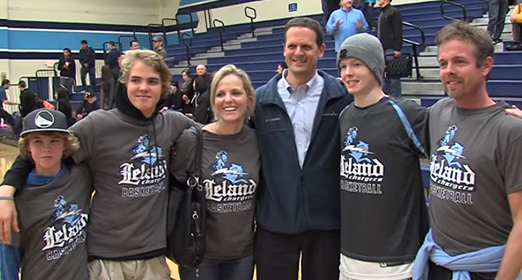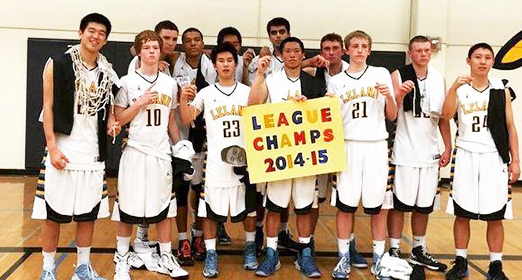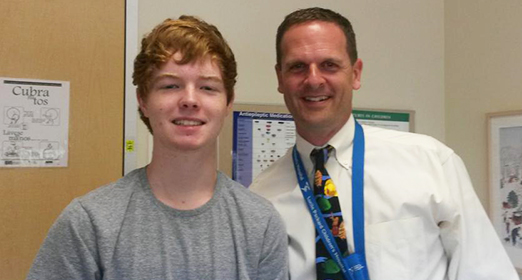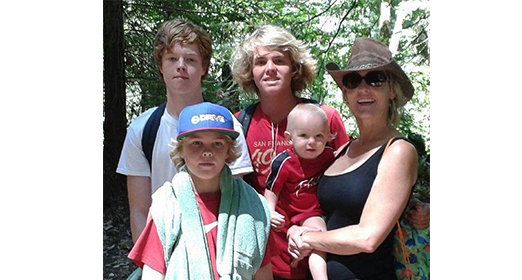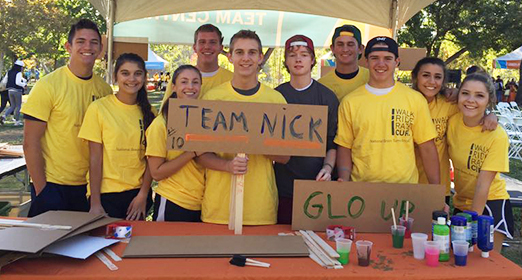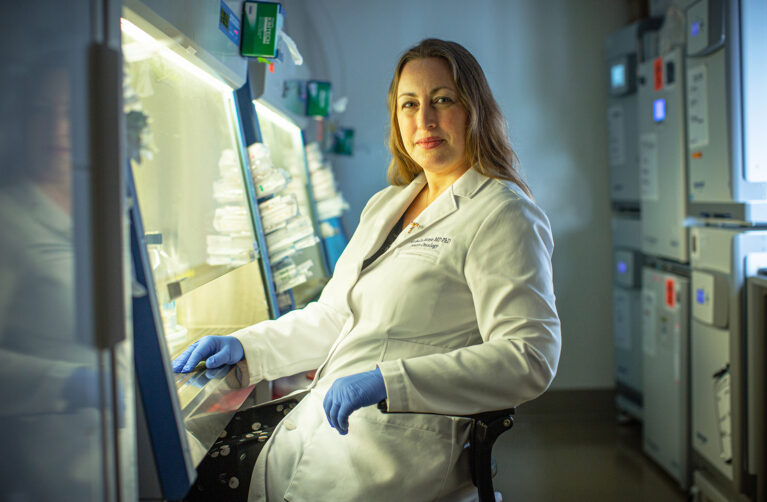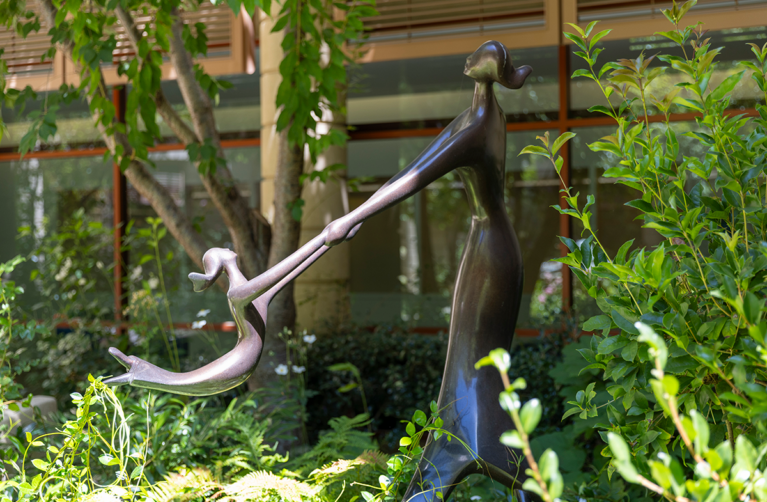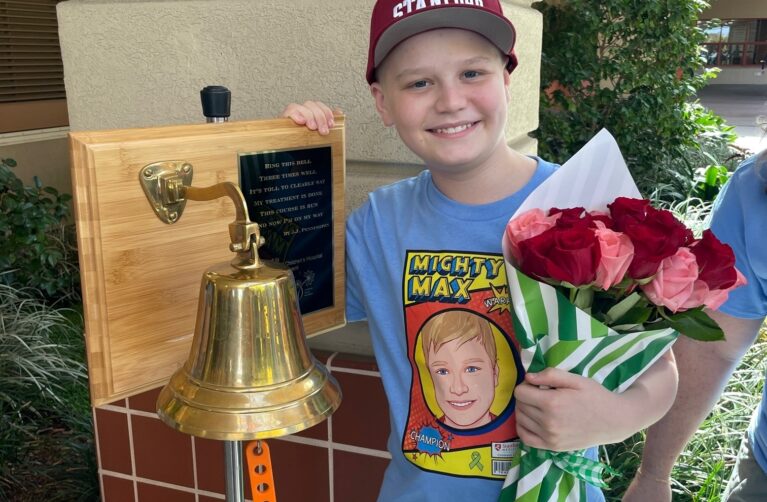Peggy Murtha, RN, a nurse in our Packard intermediate care nursery (PICN), didn’t think much of it when her eldest son Nick collided with another player while playing basketball for his club team. It was the summer before Nick’s senior year at Leland High School in San Jose, and he was preparing to return as starting point guard with hopes of leading his team to a championship.
“It wasn’t uncommon for him to fall or collide with another player,” Peggy explains. “He was a bit disoriented and nauseous, so the coach had him sit out the rest of the game. We thought he may have a concussion, so the next day we took him to urgent care.”
As a precaution, Peggy had her son stay home for the next week to recover. Then, a few weeks later it happened again: Nick collided with another player, but this time the pain didn’t subside. By the next morning his headache was so severe it had induced vomiting.
Peggy took him to their local hospital, and that’s when Nick admitted he had been experiencing dizzy spells and nausea regularly. He hadn’t wanted to worry his parents nor risk missing any more game time. After a series of tests, the pediatric neurologist told the family they needed to go straight to the emergency room.
“At this point we were so confused,” Peggy says.” I asked the doctors, ‘What’s going on? Is it related to the concussion?’” Then the life-changing news came. “They said, ‘It’s unrelated to any sort of injury. Your son has a huge mass in the upper-right part of his brain.’”
The orange-sized tumor was encapsulated in a cyst up against his brain, a good spot for removal. Unfortunately, it was unclear whether the tumor was malignant, in which case it would require months of radiation and chemotherapy.
Nick was in for the fight of his life.
But all Nick heard was that he may not be able to play basketball his senior year. His doctors gave the family two options: stay at their local hospital, or go to Lucile Packard Children’s Hospital Stanford.
“Immediately I knew we had to go to Packard Children’s,” Peggy remembers. “I knew that’s where he would get the best care possible.”
One hour later they were in an ambulance on their way to our hospital. Peggy says it felt surreal bringing her family to her workplace—it was not just for a friendly visit, but they were now a patient family. She was the mother of a cancer patient. “After we met Dr. Grant, we knew he would fix it. He was very confident and made us feel very comfortable.”
Peggy had heard of Gerald Grant, MD, our division chief of pediatric neurosurgery, but had never met him in person until then. “I was still a nervous wreck. But this sense of calm came over Nick. I remember him saying, ‘It’s ok, Mom. I got this. I’m going to be fine.’”
Meanwhile, friends, family, and the basketball community banded together in support of Nick and his family. His basketball team created special warm-up shirts in his honor. Friends shaved Nick’s initials “NM” on the side of their heads. Peggy’s friends created a fundraising page and raised more than $40,000 to support the family through the hardest trial of their lives.
The six-hour-long surgery was a success and Dr. Grant and his team were able to remove the entire mass. But they still feared the worst: a possibility that the tumor could be glioblastoma multiforme, an aggressive type of tumor with only a 3-5 percent survival rate.
“Weeks went by and we just waited,” Peggy says. “We went on a family vacation, what we thought may be our last vacation all together with our four boys.”
Finally, the pathology report came. It showed that the tumor had a protein that is not present in glioblastoma multiforme. Nick’s tumor was in fact ependymoma, a type of cancer with a 90 percent survival rate.
Suddenly the prospect of radiation and chemotherapy seemed like a small bump in the road to full recovery. Three months of treatment meant Nick would be done by December, and he could potentially return to the basketball court before the season ended.
Throughout his radiation treatment, Nick continued to go to school and attend practice to cheer on his friends. Just watching the team was enough to keep his spirits high and to keep him fighting through the most difficult of days.
Peggy returned to work part-time with a renewed sense of pride as a Packard Children’s employee and greater empathy for the patient families she serves. “I’ve been a nurse for 22 years, but I suddenly realized the importance of my job,” she says. “Nick’s nurses and doctors were so outstanding and it made a huge difference for us. I came out of this experience thinking, ‘Wow! I need to step up my game!’”
After he completed chemotherapy and his MRI showed everything was all clear, Nick wasted no time getting back to basketball (taking things slowly, of course) and working on gaining weight and strength. On January 29, Nick played in his first game of the season. Among his cheering section of friends who had supported him along his journey was his all-star surgeon, Dr. Grant.
Today, Nick is back to enjoying his last year at Leland High School and most everything is “back to normal.” There are days when Peggy still wishes that it could have been her instead of her son, that she could have taken the tumor out of Nick and put it in her own head so he wouldn’t have had to suffer through that experience at such a young age. To which Nick shrugs and says, “Mom, sh*t happens.”
Today, Nick jokes that his greatest loss was when his signature red locks fell out during chemotherapy and are now growing back blond. “But there’s hair dye for that!”
Nick plans to attend community college where he will continue to play basketball, and seek opportunities to share his story and support other kids with pediatric brain tumors.
Watch Nick’s inspiring story featured on Cal-Hi Sports.
Give hope and healing to more kids like Nick with a donation to the Children's Fund.
